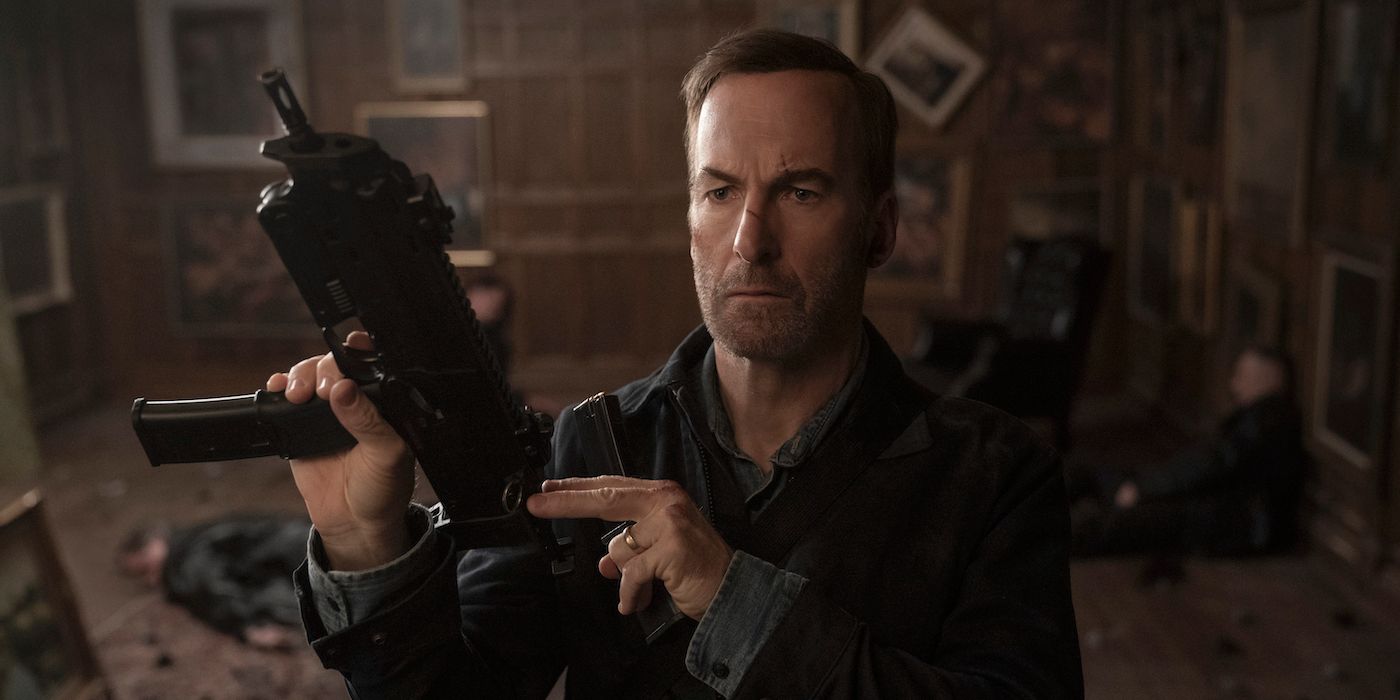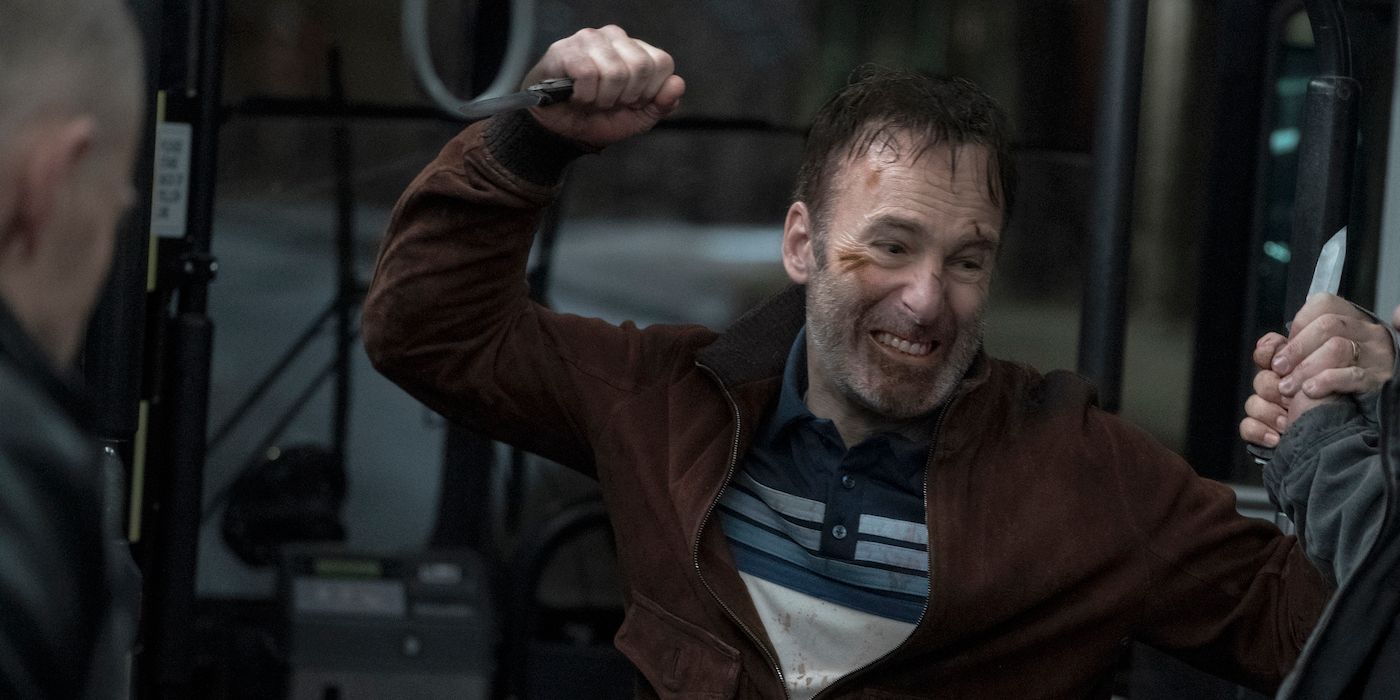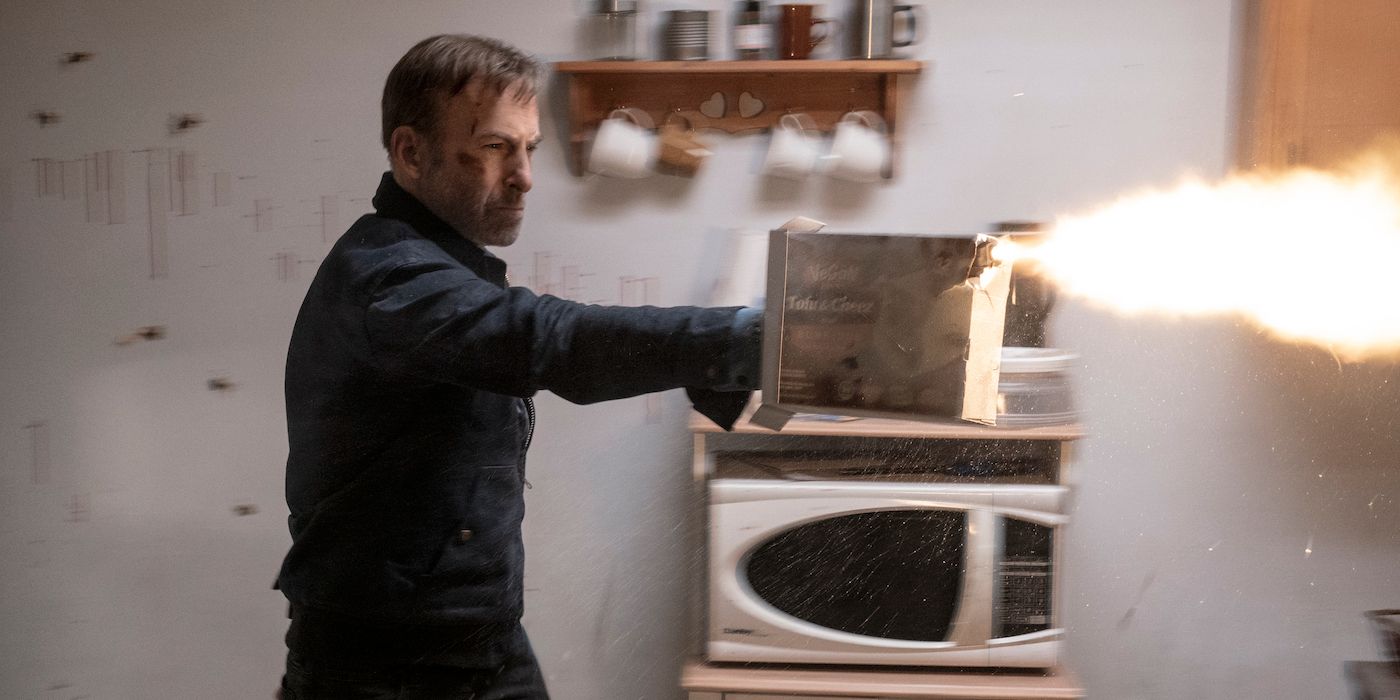I don’t know why I enjoy watching violence in movies. Perhaps it’s something primal, a way to feed an atavistic bloodlust but sated in such a way as no one was harmed in the making of these pictures. I also don’t believe movies cause violent behavior since movies serve a global audience, but levels of violence vary between countries. And yet I find real-world violence repulsive, and we should all be horrified by real violence. So why is the fake violence in a movie like Ilya Naishuller’s action film Nobody such a delightful romp? At times watching it feels like playing against my better judgment, but the film seems to understand that like its seemingly milquetoast protagonist Hutch Mansell (Bob Odenkirk) we need some kind of violent outlet because there’s a beast inside of us that needs to be set free. If we can push that beast towards “bad guys”, then we’re free to let it feed and satisfy our need for violence. Nobodydoesn’t question that need for violence; it simply accepts it and feasts.
Hutch Mansell lives a mundane existence. He crunches the numbers at a machinery company run by his father-in-law (Michael Ironside), but is looking to buy the business for himself. He has a staid domestic life where neither his wife Becca (Connie Nielsen) nor his son Blake (Gage Munroe) respects him very much. One night, a pair of robbers break in but Hutch refrains from defending himself and simply lets the crooks go. However, this home invasion reignites Hutch’s secret past, one filled with violence. Like an addict needing a hit, Hutch comes across some thugs on a bus, and proceeds to beat the crap out of them. However, one of those thugs happens to be the brother of the powerful Russian mobster Yulian (Aleksy Serebryakov). The situation escalates as more Russian baddies come for Hutch, and Hutch keeps mowing them down.
The first act of Nobody is arguably when the film is at its most interesting. Hutch lives a life of quiet desperation where nothing exciting ever happens, there’s no passion to anything he does, and there’s no end in sight. In this framework, domesticity is practically emasculating, and the only way to reclaim masculinity is through violence (if this tension sounds familiar, it was explored in David Cronenberg’s 2005 film A History of Violence), but instead of looking at that domestic/violent calling dichotomy, Derek Kolstad’s script simply chooses to indulge it without question and put Hutch on a similar path to Kolstad’s John Wick—a man with a secret past is very, very good at killing criminals of Eastern European origins.
If this sounds like negativity, I don’t intend it that way because I genuinely enjoyed Nobody. It’s an incredibly well-made action B-movie that delivers on its promise of a mild-mannered guy showing that he’s a killing machine, and then murdering folks in fun and inventive ways. Casting Odenkirk was a particularly wise decision since he knows how to bring a combination of sad-sack/wry comedy to the role that helps it pop and make you see Hutch as a guy worth rooting for rather than a violent maniac feeding his addiction. Sure, you can see similar characters in John Wick, Taken, The Equalizer, and so on, but Odenkirk makes the role his own, and stands apart from those other actors by really selling the domestic aspect of Hutch’s life. To put it another way, it’s harder to buy Keanu Reeves, Liam Neeson, and Denzel Washington as guys who keep forgetting to take the trash out and whose wives won’t sleep with them anymore.
But aside from that twist of leads, Nobody is firmly in the mold of the middle-aged-guy-with-a-past-violently-dispatches-bad-guys movie that’s risen to popularity in the 21st century divorced from any of the societal darkness raised by a movie like the original Death Wish. You already know if you like this movie or not, and it does satisfy that bloodlust we have without the moderating factors of sci-fi/fantasy or a PG-13 rating. It’s bloody, it’s brutal, and it’s also somehow loads of fun. I don’t fully understand the psychology behind it, and perhaps I don’t want to. Perhaps I don’t want to look at myself in the mirror about why I enjoyed seeing Bob Odenkirk punch a guy’s teeth out or the escapism of determining that there are clear good guys and clear bad guys operating with the same levels of violence. “But our hero isn’t a sociopath,” Nobody assures us even though deep down we know better.
And yet I honestly can’t see the harm in Nobody because, as I said, I don’t think violent entertainment makes people violent even if it does feed their violent impulses. In a strange way, Nobody provides a kind of decadence in a safe environment. The soft oldies needledrops that permeate the film almost emphasize that for all its bloody violence, Nobody is ultimately a comfort food. It has a rigid moral environment with clear heroes and villains and punishment will be dispensed accordingly. Nobody is the kind of movie that would be oddly empowering and exhilarating to a guy like Hutch Mansell if he wasn’t secretly a living weapon. The movie knows its audience is filled with Hutch Mansells, and perhaps it’s sometimes best to simply let a violent fantasy unfold when we know it’s firmly in the realm of fantasy.
Rating: B+



